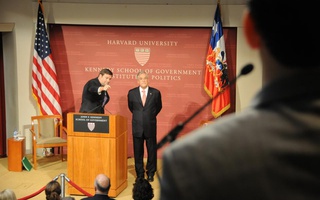SANTIAGO, Chile—History is a controversial issue in Chile. Twenty years after dictator Augusto Pinochet stepped down from “the presidency,” activists and judges are still trying to seek justice for the crimes committed during his regime. At the same time, current President Sebastián Piñera has publicly declared that “sometimes, it is best to let history sleep in peace,” calling on Chileans to focus on the future instead of dwelling on the past.
As someone who will eventually graduate with the word “history” stamped on her diploma, I naturally cringe at Piñera’s suggestion. But the more I learn about Chile, the more I see that it is in many ways trapped by its past, and that history can function as a barrier to progress.
In this fairly developed and modern country, divorce became legal only in 2004, and abortion is still illegal under any circumstance, even when the mother’s life is in danger. There is no abortion “debate” so to speak in Chile: the only thing that comes close is when politicians occasionally discuss the possibility of opening up “debate” on the issue. A complex web of history and culture keeps the topic of abortion (and other so-called moral issues) strictly out of the public discourse.
Under the deeply conservative and “pro-family” Pinochet government, women were mercilessly persecuted for trying to obtain abortions, and the fear and stigma that became associated with the procedure is still very strong. Many things have changed in Chile after the return to democracy, but abortion has remained a taboo subject.
The silence is partly due to the power and influence of the Catholic Church, which enjoys the unusual distinction of being allied with both the left and right political coalitions. During the dictatorship, the Church was an outspoken critic of the military junta’s human rights violations: Many individuals on the political left owe their lives directly or indirectly to the Church’s efforts. As a result, almost nobody wants to touch an issue that will certainly cause conflict with ecclesiastical authorities.
Chileans seem to confuse the Church of the past—which was a source of hope during a dark time, with the Church of today—which refuses to change its tune even though Chile’s repressive laws force thousands of women to seek abortions in clandestine, and sometimes terrifying, conditions. Botched abortions are believed to be the third leading cause of maternal mortality nationwide, an outcome that affects poor women—who cannot afford to have the procedure done in a safe and sanitary environment—in disproportionate numbers.
President Piñera and I probably don’t agree on many things—a woman’s right to choose, for one—but I think he was right when he said in an interview with ABC that “it is unfortunate when the past becomes an obstacle for the future.”
It is important not to forget the past—neither the crimes of Pinochistas nor religious leaders’ bravery in the face of them—but letting old loyalties and antagonisms dominate current policymaking is a serious error. I can only hope that one day, Chile will figure out how to face its history without becoming prisoner to it.
Adrienne Y. Lee ’12, a Crimson associate editorial editor, is a history concentrator in Quincy House.
Read more in Opinion
POSTCARD: A Love Letter To the Women in the Ladies CarRecommended Articles
-
POSTCARD: In the Heart of DarknessIt is impossible to describe the feeling of listening to someone praise a man who was responsible for the torture and death of thousands of Chilean citizens during his brutal 17-year regime.
-
The Miners and the PresidentOct. 13, 2010 was a joyous day for the 33 miners who were finally rescued from a collapsed mine shaft in northern Chile and reunited with their families.
-
Not Always a Land of PlentyEspecially as she makes her journey through Chile, our university’s president will hopefully see both the nation’s progress and continuing struggles and bring back a renewed desire to continue the University’s outreach and build partnerships to promote a more equitable future.
-
Faust Visits Chile, BrazilThis week University president Drew G. Faust will explore Harvard’s involvement in Latin America though a week of travel in Chile and Brazil.
-
Harvard Introduces Chilean FellowshipHarvard University will create a new fellowship for students in Chile to pursue graduate degrees at Harvard.
-
 At IOP, Chilean President Defends Response to Protests
At IOP, Chilean President Defends Response to Protests













